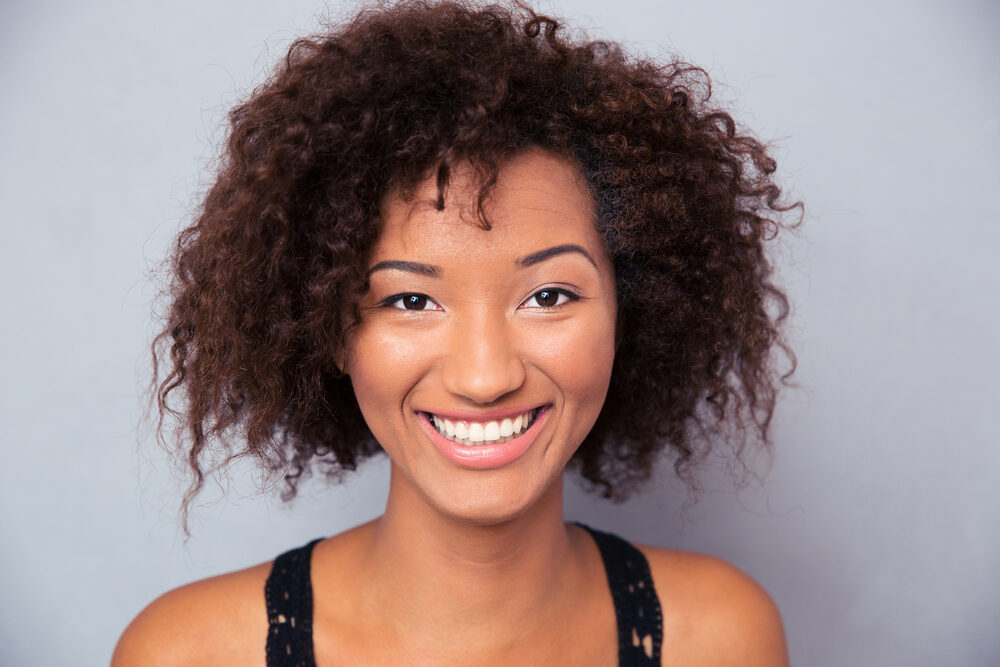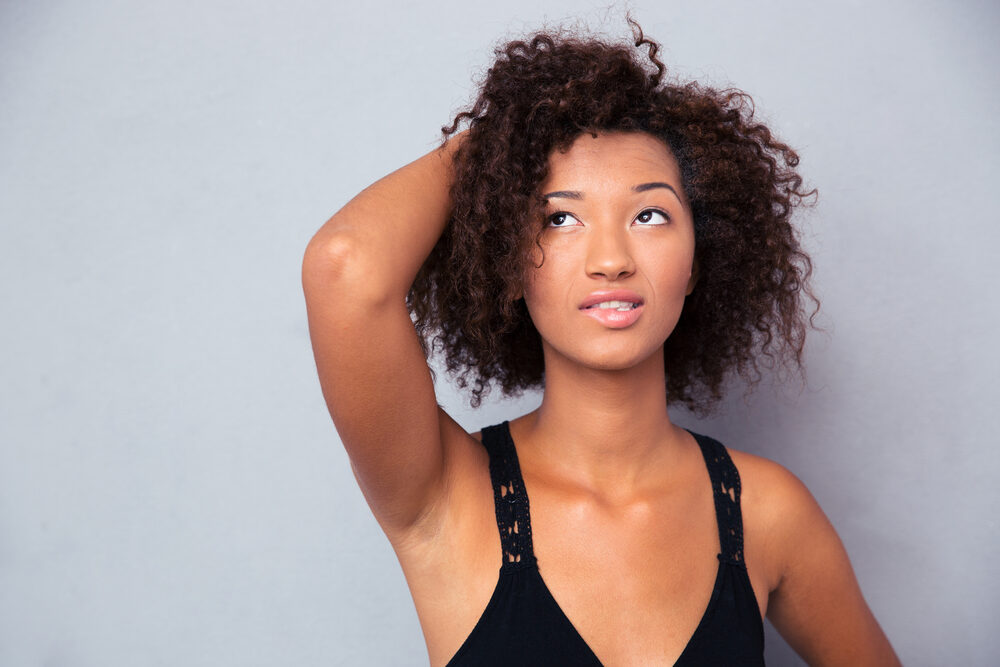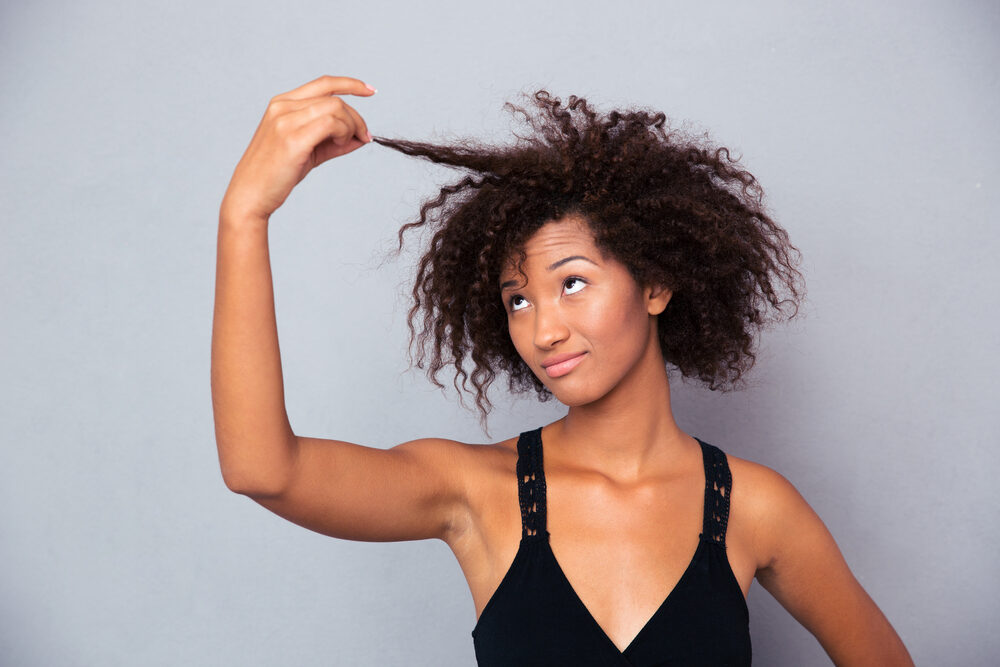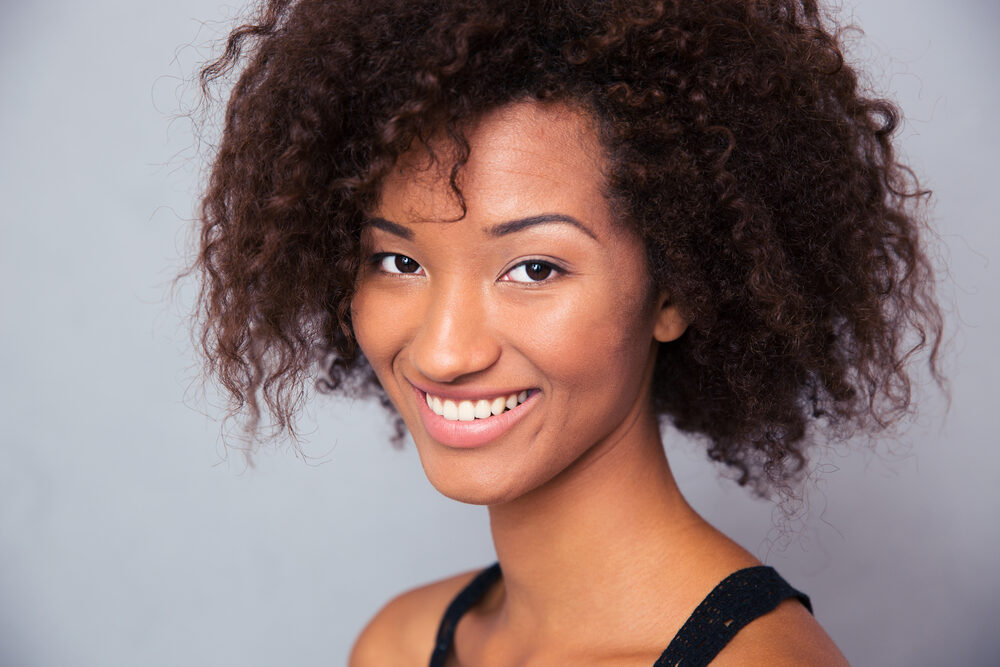
Ladies with natural hair are always on the hunt for "clean" hair products formulated without sulfates, parabens, and petrolatum, among other hair offenders. The list of ingredients to avoid goes on and on.
And as of late, dimethicone has emerged as a controversial ingredient thought to be linked to hair loss. Naturally, this has curlies all over wondering whether their favorite dimethicone-containing products could leave them bald.
Well, there's no need to wonder any longer because we'll tell you once and for all whether dimethicone causes hair loss.
Table of Contents
What Is Dimethicone?

If you've ever read through a product ingredient list on the back of any of your hair care products, you've probably seen the word "dimethicone."
Dimethicone (a popular silicone) is a synthetic substance commonly found in hair care products, including shampoos, conditioners, creams, and moisturizers.
It has multiple uses:
- It gives products a smooth, silky texture.
- It acts as a shield for the hair and scalp.
- It prevents weather-related humidity.
- It leaves hair feeling soft and looking glossy.
Dimethicone has both emollient and occlusive properties. Emollients coat the hair, leaving strands feeling soft and supple, while occlusives lock in moisture, preventing dryness and frizziness.
Does Dimethicone Cause Hair Loss?
Dimethicone does not directly cause hair loss, but the effects of this silicone have contributed to hair loss in many cases. Moreover, dimethicone can play a role in gradual hair loss.

The central link between dimethicone and hair loss is the ingredient's water insolubility. Dimethicone is not water-soluble, which means that it repels water and is difficult to wash out of the hair.
Unfortunately, most are unaware that repeated use of products containing water-insoluble ingredients can lead to build-up on the hair and scalp. This severe hair and scalp build-up weaken strands, resulting in breakage and eventually hair loss.
How Buildup Leads to Hair Loss
You may be wondering just how buildup can result in hair loss. We'll tell you how in the following sections:
Clogged Follicles

The scalp is the foundation of healthy hair growth, and it needs adequate moisture to produce lovely curls and locks. Constantly introducing dimethicone-based hair products to the scalp blocks moisture from entering, leaving hair follicles clogged.
When hair follicles are blocked by dimethicone build-up, hair strands will still grow in, but they will be thinner and weaker than normal.
These thin hair strands are naturally more fragile than healthy ones, so they shed easily and cannot withstand harsh chemical treatments, frequent styling, or product overload. Also, these hair strands split and break off easily, resulting in hair loss.
Hair Dryness and Split Ends
Dimethicone ravages individual hair strands through damage and restriction of the outer layer of the hair shaft, known as the hair cuticle. The cuticle layer protects hair strands and allows moisture in and out.
It acts as a security door, managing which hair products and substances can enter the hair shaft. In a flash, dimethicone puts a lock on the door of the cuticle layer, not allowing any products or moisture in or out.
Hair strands that lack sufficient moisture due to dimethicone build-up can split at the ends easily.
And the further up the hair shaft the strands split, the greater the risk of widespread breakage and hair loss (and hair thinning). A shortage of moisture in the hair also leaves strands weak and brittle, causing them to break off.

Is Dimethicone Bad for Hair?
Dimethicone is insidious in how it harms your hair and scalp. On the surface, it seems to be a desirable ingredient because of how great it initially makes your hair look and feel. But the gradual carnage that it inflicts on the hair and scalp is not worth the short-term benefits that it provides.
If you've been using products containing dimethicone, you're probably wondering how you can get it out of your hair immediately. In the following section, we will give you a few tips on how to rid your hair of dimethicone.
How To Remove Dimethicone From Hair
To remove dimethicone from the hair, you will need loads of patience and potent products that can stand up to the buildup.
Also, keep in mind that you may need to repeat these treatments several times to remove all of the build-up and residue left behind by dimethicone. Use the tips below to eliminate dimethicone from your hair and scalp.

Use a Clarifying Shampoo
Clarifying shampoos (like these) are specifically formulated to deliver a deep cleansing session to the hair and scalp. The shampoos contain surfactants (soap-like substances) that break down silicones, chemicals, grease, and other forms of build-up.
Clarifying shampoos are harsher than regular shampoos and can result in severe hair and scalp dryness. So, be sure to use a moisturizing conditioner or deep conditioner after a clarifying shampoo treatment.
Try An Apple Cider Vinegar Rinse
Apple cider vinegar, a common household ingredient, has been touted for its hair-clarifying abilities. A quick apple cider vinegar rinse will jumpstart the clarifying process to remove dimethicone build-up from your hair. Follow the steps below to make an apple cider vinegar rinse.
- Mix equal parts of apple cider vinegar and water in a bottle.
- Apply the mixture to the hair and scalp liberally.
- Allow the rinse to sit for up to five minutes.
- Rinse hair thoroughly.
- Follow up with a moisturizing conditioner to prevent dryness.
Apply a Baking Soda Paste
Using baking soda is another natural way to remove silicone build-up caused by dimethicone. Baking soda is made of sodium bicarbonate, a clarifying substance that acts as an exfoliant.
That's why it's a great remedy for removing dimethicone buildup. Follow the steps below to make a baking soda paste at home.
- Mix one tablespoon of baking soda with three tablespoons of water in a small bottle.
- Stir the ingredients until a paste is formed.
- Apply the paste to wet hair. Be sure to cover the entire length of the hair.
- Rinse your hair and scalp thoroughly.
- Use a moisturizing conditioner to keep hair dryness at bay.

Use Honey and Cinnamon
Mixing honey and cinnamon is one of many exfoliation methods that will nourish your hair and scalp as it cleanses. Honey soothes and moisturizes the hair and scalp, while the grainy texture of the cinnamon lifts away debris, residue, and - you guessed it - dimethicone.
Follow the steps below to make a honey and cinnamon exfoliant.
- In a small bowl, combine one tablespoon of honey with half a teaspoon of cinnamon.
- Using your hands, apply the mixture to your hair and scalp.
- Allow the mixture to sit for about 15 minutes.
- Rinse hair thoroughly with cool water.
Should You Avoid Dimethicone?
Yes, you should avoid dimethicone whenever possible. This ingredient creates an illusion of healthy hair. For a while, your hair may look shiny and glamorous. But eventually, you will end up with dry, lifeless hair.
As the damaging effects of dimethicone have become more widely known, more brands have decided to eliminate the ingredient from their products.
Since dimethicone-free and silicone-free products are widely available, you'll want to opt for those instead if you want to minimize build-up and hair loss.
Because dimethicone may still be found in various hair care products, you may need to overhaul your hair product stash.
Unfortunately, some products might be difficult for you to part with. But ditching them will be one of the best decisions you'll ever make concerning the health of your hair.
Note: If you want to continue to use dimethicone, be sure to clarify your hair religiously to reduce your chances of buildup. But be aware that excessive clarifying can lead to extremely dry hair.

- How To Prevent Curly Hair Loss
- Does Using Pomade Cause Hair Loss?
- Can Amlodipine Cause Hair Loss?
- Do Pantene Products Cause Hair Loss?
Dimethicone has been shunned by many in the hair industry for good reason. It causes severe product build-up and is indirectly linked to hair loss.
Therefore, removing it from your hair and product supply is to your advantage. As you eliminate dimethicone from your hair care routine, you will experience hair that is truly healthy and lustrous.




